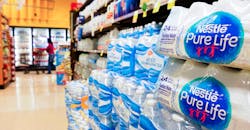Nestle to Spend Up to $2.1 Billion on Recycled-Plastic Plan
Nestle SA plans to spend as much as 2 billion Swiss francs ($2.1 billion) in a plan to push the plastics industry to address the dearth of recycled packaging that’s safe to use for food.
The KitKat maker will earmark more than 1.5 billion francs to pay a premium for such plastic to encourage production, the company said Thursday. Recyclers have tended to neglect that market because of the difficulties in making non-toxic food-grade packaging.
“Food-grade recycled plastic is extremely expensive today, and nobody wants to pay -- so nobody makes it and prices don’t come down,” Chief Executive Officer Mark Schneider said at a media event in Zurich. “We want to use our scale aggressively to build stable demand.”
Nestle said it has other projects in the field, including a 250 million-franc venture capital fund to develop packaging technology. The company said it will try to mitigate the impact of higher plastic costs through efficiencies.
Food and beverage makers have increasingly come under pressure from consumers and environmental groups for using too much plastic. Nestle has pledged to make all of its packaging recyclable or reusable by 2025, and it said aims to reduce use of newly made plastic by a third by the same year. That falls short of a goal for a 50 percent reduction at Unilever, which is testing refill stations for products like laundry detergent and shampoo.
Greenpeace, which has urged Nestle to focus on delivery systems based on containers that can be refilled and reused, said reducing single-use plastic should not lead to “false solutions” like recycled content and material substitution.
“If Nestle wants to stop polluting the world, it needs to end its reliance on plastic,” Matthias Wuethrich, senior campaigner at Greenpeace Switzerland, said in an e-mailed statement.
As of 2025, the European Union will require that at least 25% of the material in beverage bottles consist of recycled plastic.
Nestle opened a research site near Lausanne last year to develop packaging that’s less harmful to the environment, such as fully biodegradable paper-based water bottles and refillable containers.
Like rivals PepsiCo Inc. and Danone, the Swiss company is experimenting with water dispensers in an attempt to shift to selling beverages without bottles.
“The environmental issue will remain a topic in the next few years, and companies will have to back up words with real investments,” said Patrik Schwendimann, an analyst at Zuercher Kantonalbank. “The whole industry will face higher costs. The positive return is that companies will look good to the public.”
Nestle shares climbed as much as 0.9% in Zurich. They have gained 26% over the past year.
By Corinne Gretler
About the Author
Bloomberg
Licensed content from Bloomberg, copyright 2016.
